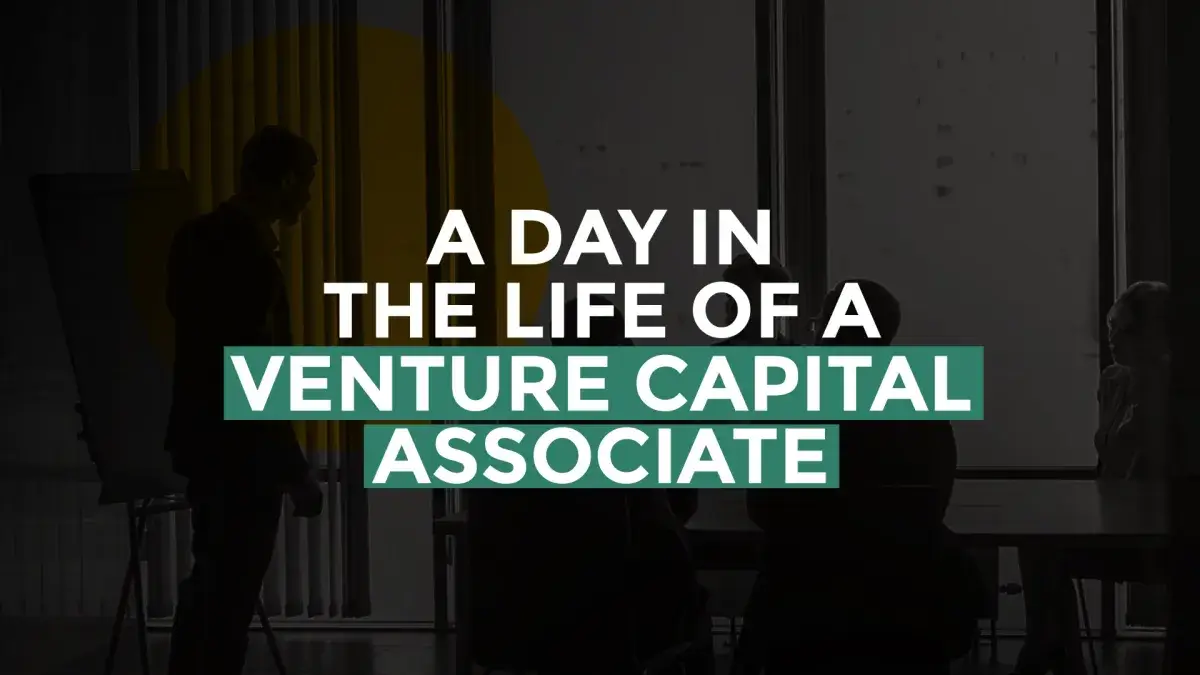A day in the life of a Venture Capital Associate

Here's What We've Covered!
“Venture capital is about capturing the value between the start-up phase and the public company phase” -Fred Wilson, an American businessman and Venture Capitalist. Yes, this quote very much encapsulates the essence of Venture Capitalism. These companies are typically knights in the shining armour for young companies. Venture capitalists (VC) are investors who see potential for good returns on investment (ROI) in certain early stage companies and choose to put their money into it. This is done in exchange of an ownership interest / equity stake.
Hierarchy (top-down) in VC firms is as follows: Managing Partners -> Vice President / Principal -> Associate Vice President ->
Senior Associate / Associate -> Analyst.
An analyst is typically an entry level job which mostly desk-based and involves origination of ideas, generating leads and doing basic due-diligence work. An associate is a slightly more senior level and this is where the actual action begins. In fact these days most companies have the roles of Analyst and an Associate all rolled into one.
Let’s take the example of our friend Meera who is an associate with a leading Venture Capital Firm. Meera, an MBA and a CFA, has over two years of experience in a consulting firm. A regular working day for Meera unfolds as under.
Morning
Meera’s morning typically starts at 8:00 am where she browses through leading newspapers, blogs, online news feeds and possibly every other resource which gives her an update about the existing portfolio company, next hot investment prospect or simply the competitors’ next moves.
Mid-Morning
Most of the mid-morning is spent in meetings and phone calls with other partners. Whatever new investment opportunities Meera has identified during her research is discussed and analysed in the meeting. This meeting demands Meera to have already conducted a thorough due-diligence on the targets. At times it may happen that Meera has some contacts already working in those target companies, hence they also join the meeting. This helps Meera to throw some more light on the finer nuances of the prospects.
Afternoon
A Venture Capital Associate is not just involved with identifying and screening prospective investment but also keeping a tab on the existing companies in the portfolio. In the afternoon, Meera gets in touch with all those companies through online chats, emails or phone calls and takes a roundup of what’s happening there. Even her lunch hours are not devoid of work! It’s a common practise for Meera to meet the executives of existing portfolio companies over lunch and discuss the affairs. During this, Meera keeps taking mental notes as to how the company is progressing, whether the investment is getting maximised or does this company call for an exit.
Post lunch hours, Meera prepares a report on her observations and inferences, supports it with data and circulates it to other partners for reference.
Evening
With most of the work completed by post lunch hours, Meera’s evenings are slightly relaxed. But she chooses to be spend the time in preparation for the meeting next morning. So over coffee, she meets a budding entrepreneur-the owner of an e-commerce start-up, which Meera believes could be the next big thing. The entrepreneur shares his vision with Meera and discusses his business plan in hopes of procuring a funding. Meera, on the other hand, critically evaluates the venture and gauges its growth prospects. She takes the notes and begins drawing a report on her way back home.
A VC job is not a typical 8-9 hours job and day-to-day life of an associate varies significantly across and within funds. While typical days pan out as mentioned above, hectic days will involve working simultaneously on various on-going deals (at various stages) in addition to identification & sourcing of new deals and networking. On the other hand, there will be days with no on-going deals to work on but attending conferences & events and meeting entrepreneurs for new deal sourcing and preparing market reports.
To sum up, some of the skills required to be a great VC associate are: strong mathematical & analytical skills, ability to manage and prioritize large amounts of tasks, ability to source & analyse information easily to help build a thesis around companies & industries and great networking & social skills.
NOTE: To understand some of the terms about VCs used in this article, stay tuned for the next article “Structure of a VC fund”.
Resent Post
>
Best Study Abroad Courses for Commerce Graduates
>
Emerging commerce career options in India (2026): From CA to Data Analyst
>
ACCA Opportunities You Didn’t Know About – Think Beyond Audit!
>
Which Courses After 12th Commerce With High Salary Are in Demand Worldwide?
>
How to Find ACCA Jobs Online After Qualifying: Real Portals, Tips & Career Guidance
Follow Us For All Updates!




